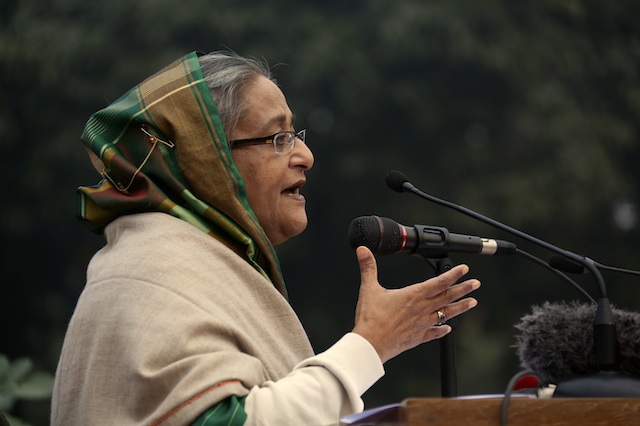SUMMARY
This is AI generated summarization, which may have errors. For context, always refer to the full article.

DHAKA, Bangladesh (UPDATED) – Bangladesh’s Prime Minister Sheikh Hasina insisted Monday, January 6, her walkover win in an election boycotted by the opposition was legitimate and blamed her rivals for the unprecedented bloodshed on polling day.
In defiant comments the day after her re-election, Hasina accused the main opposition Bangladesh Nationalist Party of making a mistake by shunning the vote and made clear she was not in the mood to offer any olive branches to BNP leader Khaleda Zia, her arch-enemy.
Hasina’s ruling Awami League cruised to victory in Sunday’s (January 5) election after the BNP and 20 other opposition parties refused to take part over fears the contest would be rigged.
But although the landslide should allow Hasina to rule for another five years, the opposition says her victory lacks any credibility. It has called for new polls organized by a caretaker government to be held as soon as possible.
Washington expressed disappointment at the election and also urged a new vote that would “credibly express the will” of the people.
“With more than half of the seats uncontested and most of the remainder offering only token opposition, the results of the just-concluded elections do not appear to credibly express the will of the Bangladeshi people,” State Department deputy spokeswoman Marie Harf said.
UN leader Ban Ki-moon criticized both the main parties and called for them “to resume meaningful dialogue and to urgently address the expectations of the people of Bangladesh for an inclusive political process”.
Speaking to foreign journalists at her official residence in Dhaka, Hasina earlier Monday said the opposition boycott of the polls should “not mean there will be a question of legitimacy”.
“People participated in the poll and other parties participated,” she added in reference to a handful of Awami League allies who did stand.
The BNP blames the government for the crisis after it refused demands for the election to be organized by a neutral caretaker administration as in previous years.
The prime minister said she had offered Zia – who has been under de facto house arrest for over a week – the chance to join an interim cross-party government before the vote.
“I offered to share power with our opposition, I have done as much as I can do but they didn’t respond,” she said.
“Now if they realize that they made a mistake in not participating in the election, perhaps then they may come forward to discuss with us or make an offer,” she added.
“If they come forward to discuss with us, they have to leave all these terrorist activities behind because what they are doing, it is absolutely killing people, killing police, killing innocent people.”
Most violent polls
Sunday’s vote was the most violent in Bangladesh’s history, with police saying at least 26 were killed while nearly 600 polling stations were attacked by opposition supporters.
While there has been no official word on the nationwide turnout, election officials said less than one in four people had voted in the capital Dhaka.
The credibility of the poll had been undermined even before polling day when 153 Awami League members or allies were declared elected unopposed to the 300-seat parliament.
The Daily Star said the Awami League had won “a hollow victory which gives it neither a mandate nor an ethical standing to govern effectively”, while the New Age daily said Hasina was leading the country towards disaster.
“What do you want? I should start crying: ‘Oh we have crisis, we have crisis?’ I am leading the country,” Hasina, who first came to power in 1996 and then thrashed Zia in a 2008 comeback, said of her critics.
Zia has been under de facto house arrest after calling a series of protests in recent weeks designed to derail the election.
Although Bangladesh has been rocked by political violence throughout its short history, the leading rights monitor Ain O Salish Kendra said it was by far the deadliest election day and campaign period.
Opposition demands
BNP vice president Shamsher Chowdhury said the low turnout showed the overwhelming desire for elections to be overseen by a neutral administration.
“This government must declare this election null and void and we need a new election organized by a non-party government,” he told Agence France-Presse. “The government should not waste any more time.”
Any agreement on a new vote carries huge risks for Hasina, with an eve-of-election poll showing she would have lost in a straight contest with the BNP.
Analysts expect the standoff will fan the flames after the deadliest year of unrest since Bangladesh broke free from Pakistan in 1971.
The former East Pakistan is the world’s eighth most populous nation but also one of the poorest. The turmoil will undermine efforts to improve the lot of its population of 154 million – a third of whom live below the poverty line. – Rappler.com
Add a comment
How does this make you feel?
There are no comments yet. Add your comment to start the conversation.